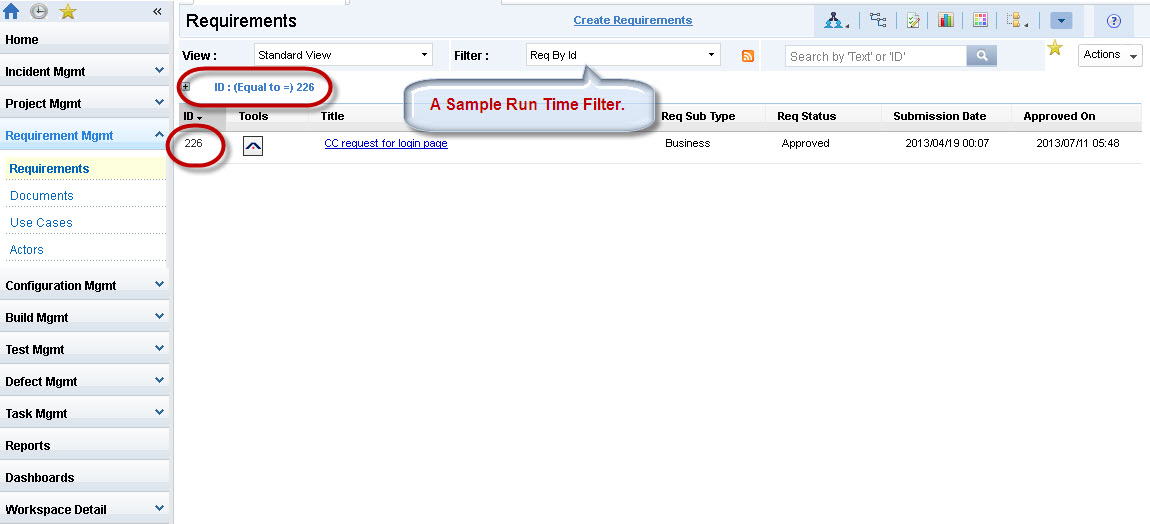With the kind of competition that exists in the market, it is quite understandable that an ALM tool is rated according to the varying features it can provide. An ALM tool is expected to cover all corners in the lifecycle of a project and for doing that, the tool needs to host a vast range of features some being highly critical and some not so. One such functionality is the ‘Searching’ capability of an ALM tool. So let us discuss this functionality in a greater depth, as to why this feature is important in the context of ALM, and how Kovair deals with it.
The importance of the Searching functionality of an ALM tool can be easily understood from a simple example. Imagine a team working on a project like building a project management application. Now, when dealing with a subject like this, it is obvious that this one big requirement would be broken down into minute smaller requirements.
Naturally, different development teams would be assigned different modules and they would start working on them. All these requirements are stored in the ALM tool, and their relevant details are updated accordingly in the course of this work. Now, try imagining about finding out a specific requirement that the business analyst wants to update. This is where the importance of the filters and search functionality comes in.
Kovair has various ways to manage the searching functionalities in the application. The different options include:
- ID and Text Search
- Search with a specific ID to retrieve the particular record
- Search with a text phrase, to pull out all the matching items from the system
- Assisted search like ‘Last 5’, which retrieves the last 5 items that have been entered into the system
- Filters in Kovair
- User defined filters, which are completely customizable according to the fields that are defined in the artifacts
- Run time filters, which allow the user to specify the search criteria, whenever the filter is used
- Global filters, which can be defined at Site level (equivalent to an organization) and are available across all the projects
- Shared filters, which are defined at Workspace level (equivalent to a project) and are available across all the artifacts in the Workspace
Now, let us discuss these features of Kovair in detail:
ID & Text Search

Kovair has an ‘ID & Text Search Box’ which has extensive capabilities. The Search box is intelligent enough to understand whether the user is attempting a text search or an id search. This effectively means that Kovair has one single search box, which can perform both id search and text search.
When a user enters a numeric value, the system searches across record IDs and retrieves data from the system. On the other hand, when a user enters a text phrase, the system retrieves items corresponding to the matching texts.
Kovair also facilitates queries like ‘Last 5’ or ‘Last 25’, which would pull out the last 5 or last 25 entries that have been added into the system. These kinds of searches help the user in retrieving dynamic search results from the system, with the same command.

Filters in Kovair
Kovair has different types of filters which allow users to search specific sets of records and find what they are looking for. By default, Kovair retrieves the data, by virtue of the system defined filter. However, Kovair users can choose to create customized filters according to their specific needs. All that a Kovair user needs to create a new filter is an appropriate access right.

A specific type of filter that is available in Kovair is the Run Time filter, which allows users to set filter criteria in run time. You can create run time filters in Kovair based on the different fields that are available within an artifact. Once designed every time the corresponding filter would be used, the system would allow the user to define the criteria based on which the system should retrieve data. The different types of fields that are available in Kovair can be used for this purpose depending on the needs of the user.

Apart from defining filters specifically for each artifact, Kovair also has the concept of Global and Shared filters, which allow the users to create filters at the Workspace (equivalent to project) and Site (equivalent to organization) level.
Global filters are defined at Site level, whereas the Shared filters are defined at Workspace level. This effectively means that a Global filter can be used in a range of Workspaces the user has access to, and the Shared filter can be used across all the entities in a particular Workspace. The primary advantage of such filters is the fact that the creation of similar types of filters in various artifacts can be avoided.
With all these searching mechanisms prevalent in the system, Kovair provides its users with a range of efficient searching options, which in turn allows the users to use the tool more effectively.
Request for Free Live Product Demo from our Engineers!


